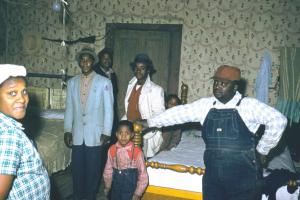Tidbits - October 8, 2015 - Ethel Rosenberg Celebrated; Elizabeth Warren and #BLM; The Obama Presidency; Racist Violence - in Kansas; Syriza and its 'Left' Critics; Pope Francis; Announcements; and more...
Portside
 Fracking Dakota: Poems for a Wounded Land, Peter Neil Carroll's new collection, takes us on a fascinating odyssey across an increasingly broken America. With a cast of characters as disparate as Billy the Kid, closet racists, grave robbers, ghosts along the Natchez Trace, blue collar workers and the short-sighted corporations that exploit them, these poems share an undercurrent of looming disaster, a deep knowing that things are about to turn bad. (Cultural Weekly)
Fracking Dakota: Poems for a Wounded Land, Peter Neil Carroll's new collection, takes us on a fascinating odyssey across an increasingly broken America. With a cast of characters as disparate as Billy the Kid, closet racists, grave robbers, ghosts along the Natchez Trace, blue collar workers and the short-sighted corporations that exploit them, these poems share an undercurrent of looming disaster, a deep knowing that things are about to turn bad. (Cultural Weekly)
 Sanders faces a problem that often confronts progressive mavericks who strike a chord with the Democratic electorate, but who routinely fail to ring a bell with voters of color. They have often been blinded by cultural assumptions that devalue the sensibilities of the black community. But in 21st-century America, race is fundamental. Sanders has readjusted his policy platform and stump speeches, addressing racism and the criminalization of the black community.
Sanders faces a problem that often confronts progressive mavericks who strike a chord with the Democratic electorate, but who routinely fail to ring a bell with voters of color. They have often been blinded by cultural assumptions that devalue the sensibilities of the black community. But in 21st-century America, race is fundamental. Sanders has readjusted his policy platform and stump speeches, addressing racism and the criminalization of the black community.
 Meet Greensboro, North Carolina native Rhiannon Giddens; see and hear why she has taken the music world by storm. Hear her music, and that of the Carolina Chocolate Drops. See why she is stretching the borders of traditional folk music, blues, country and old-time music. Hear her tribute to the Charleston Nine.
Meet Greensboro, North Carolina native Rhiannon Giddens; see and hear why she has taken the music world by storm. Hear her music, and that of the Carolina Chocolate Drops. See why she is stretching the borders of traditional folk music, blues, country and old-time music. Hear her tribute to the Charleston Nine.
 I celebrate Radical Reconstruction, a brief moment of glory, no matter how blindly and halfheartedly we, as a nation, did it. Did Reconstruction end racism? No. Does that make it a failure? No again. Considering it a failure is like considering the civil rights movement a failure because it only abolished segregation and not racism.
I celebrate Radical Reconstruction, a brief moment of glory, no matter how blindly and halfheartedly we, as a nation, did it. Did Reconstruction end racism? No. Does that make it a failure? No again. Considering it a failure is like considering the civil rights movement a failure because it only abolished segregation and not racism.
 Reader Comments: The GOP, Trump and the Appeal to Reaction; No Union Mines in Kentucky; Black Panther Party film; Lessons from Alabama's Black Communists and the #BLM; Indigenous People's History of the United States; Serena Williams; Climate Change and Workers;
New Resource: Black Lives Matter Syllabus;
Livestream Sept. 18: Unions, Workers, and the Democratic Party
Reader Comments: The GOP, Trump and the Appeal to Reaction; No Union Mines in Kentucky; Black Panther Party film; Lessons from Alabama's Black Communists and the #BLM; Indigenous People's History of the United States; Serena Williams; Climate Change and Workers;
New Resource: Black Lives Matter Syllabus;
Livestream Sept. 18: Unions, Workers, and the Democratic Party
 On the 60th anniversary of Emmett Till's murder, his cousin says history still hasn't told the whole story. His cousin recalls the night he last saw him. It's been 60 years since the murder of Emmett Till, but his story remains unfinished. His death helped spark the civil rights movement and frame the ongoing debate over racism in America.
On the 60th anniversary of Emmett Till's murder, his cousin says history still hasn't told the whole story. His cousin recalls the night he last saw him. It's been 60 years since the murder of Emmett Till, but his story remains unfinished. His death helped spark the civil rights movement and frame the ongoing debate over racism in America.
 False history marginalizes African Americans and makes us all dumber. The Confederates won with the pen (and the noose) what they could not win on the battlefield: the cause of white supremacy and the dominant understanding of what the war was all about. We are still digging ourselves out from under the misinformation they spread. When each state left the Union, they made clear they were seceding because they were for slavery.
False history marginalizes African Americans and makes us all dumber. The Confederates won with the pen (and the noose) what they could not win on the battlefield: the cause of white supremacy and the dominant understanding of what the war was all about. We are still digging ourselves out from under the misinformation they spread. When each state left the Union, they made clear they were seceding because they were for slavery.
Spread the word